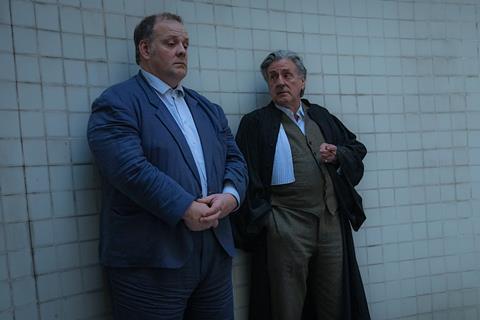Daniel Auteuil directs and stars as a lawyer defending a murder case in this by-the-numbers French legal drama

Dir: Daniel Auteuil. France. 2024. 115mins
Daniel Auteuil directs, produces, co-writes and stars in this solid, slightly plodding courtroom drama about a jaded barrister who finds himself unexpectedly emotionally connected to what should be just another ordinary case. Auteuil plays Jean Monier, the lawyer appointed to defend Nicolas Milik (Grégory Gadebois), a gentle teddy bear of a man and a loving father who has been accused of murdering his wife. The more Jean explores the case, the more he becomes convinced of his client’s innocence.
This filmmaking is not about taking risks or pushing the envelope
This is Auteuil’s fifth outing as a director: his first three pictures – The Well-Digger’s Daughter (2011), Fanny and Marius (both 2013) were remakes of Marcel Pagnol’s 1940s Marseille trilogy; his fourth, The Other Woman (2018), was adapted from a play by Florian Zeller. For his latest, Auteuil turns to the work of the late Jean-Yves Moyart (aka the blogger Maître Mô), a criminal lawyer who drew on his experiences of the French legal system to become a best-selling author. An Ordinary Case will be most warmly received in territories that embraced the source material; elsewhere, Auteuil’s name should be a draw, although it’s possible that audience appetites for French courtroom dramas may have been at least partially sated by Anatomy Of A Fall.
Comparisons with Justine Triet’s Palme d’Or-winner are inevitable and unfortunate. While Auteuil delivers a typically nuanced performance, the screenplay is a rather leaden, by-the-numbers affair and is not in the same league as the serpentine elegance of Triet’s film. A non-linear structure uses the three days of the trial, set in January 2020, as a framework around which to structure a series of flashbacks illustrating the various accounts of the suspects. (A local bar owner who is Nicolas’s only friend, played by Gaëtan Rousse, is also accused of involvement in the murder.)
We first meet Nicolas as he’s ladling out pasta for his numerous children. He’s plump, a little harassed. He looks like harmlessness incarnate. When the police come to his door to arrest him on suspicion of murder, Nicolas seems shell-shocked. Unable to process the fact that his wife, a mean drunk who would regularly pass out on a public bench in the local village, is dead, he persistently refers to her in the present tense.
It’s a strong performance from Gadebois, who plays Nicolas as a beaten-down victim with just enough hardness around his eyes to give us the occasional moment of doubt. Jean, who usually prefers to prosecute rather than defend, is moved by this sad, defeated man who is more concerned for his children than he is for his own plight. He decides to take the case.
Unfortunately, for a film that unfolds predominantly in the court, the depiction of the legal proceedings is lacklustre. Jean displays little of the brilliance and panache that would warrant his hot-shot reputation; his closing statement is weak, both legally and dramatically. And the screenplay has seemingly chosen to ignore the fact that forensic science exists. Fussy, formal classical music on the score adds to the sense that this filmmaking is not about taking risks or pushing the envelope.
Still, it’s watchable enough, up to a point, thanks to the quality of the cast, which also includes Sidse Babett Knudsen as Jean’s colleague and partner. A shocking final coda, however, feels exploitative and unearned, highlighting the manipulative qualities of the storytelling rather than delivering the gut punch that was presumably intended.
Production companies: Zazi Films
International sales: Studiocanal Sebastien.Cauchon@Studiocanal.Com
Producers: Hugo Gélin, Nelly Auteuil
Screenplay: Steven Mitz, Daniel Auteuil
Cinematography: Jean-François Hensgens
Production design: Christian Marti
Editing: Valérie Deseine
Music: Gaspar Claus
Main cast: Daniel Auteuil, Grégory Gadebois, Sidse Babett Knudsen, Alice Belaïdi, Suliane Brahim, Gaëtan Roussel






![The Brightest SunScreen[Courtesy HKIFF]](https://d1nslcd7m2225b.cloudfront.net/Pictures/274x183/3/5/0/1448350_thebrightestsunscreencourtesyhkiff_312678.jpg)















![The Brightest SunScreen[Courtesy HKIFF]](https://d1nslcd7m2225b.cloudfront.net/Pictures/100x67/3/5/0/1448350_thebrightestsunscreencourtesyhkiff_312678.jpg)

